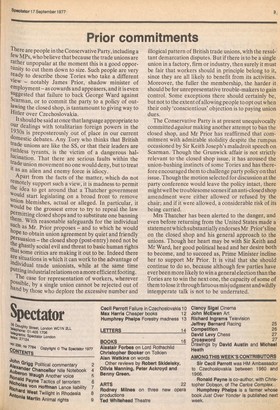Prior commitments
There are people in the Conservative Party, including a few MPs, who believe that because the trade unions are rather unpopular at the moment this is a good oppor tunity to cut them down to size. Such people are very ready to describe those Tories who take a different
view — notably James Prior, shadow minister of
employment — as cowards and appeasers, and it is even suggested that failure to back George Ward against Scarman, or to commit the party to a policy of outlawing the closed shop, is tantamount to giving way to Hitler over Czechoslovakia.
It should be said at once that language appropriate to our dealings with totalitarian foreign powers in the
1930s is preposterously out of place in our current
domestic debates. Any Tory who thinks that British trade unions are like the SS, or that their leaders are
ruthless tyrants, is the victim of a dangerous hallucination. That there are serious faults within the trade union movement no one would deny, but to treat n as an alien and enemy force is idiocy.
Apart from the facts of the matter, which do not remotely support such a view, it is madness to permit the idea to get around that a Thatcher government would start legislating on a broad front to remove union blemishes, actual or alleged. In particular, it would be the grossest error to try to repeal the law
Permitting closed shops and to substitute one banning them. With reasonable safeguards for the individual
such as Mr. Prior proposes — and to which he would hope to obtain union agreement by quiet and friendly Persuasion — the closed shop (post-entry) need not be
the ghastly social evil and threat to basic human rights that some critics are making it out to be. Indeed there re situations in which it can work to the advantage of Mdividual trade unionists, while at the same time Putting industrial relations on a more efficient footing. The case for representation of workers, wherever possible, by a single union cannot be rejected out of and by those who deplore the excessive number and
illogical pattern of British trade unions, with the resultant demarcation disputes. But if there is to be a single union in a factory, firm or industry, then surely it must be fair that workers should in principle belong to it, since they are all likely to benefit from its activities. Moreover, the fuller the membership, the harder it should be for unrepresentative trouble-makers to gain control. Some exceptions there should certainly be, but not to the extent of allowing people to opt out when their only 'conscientious' objection is to paying union dues.
The Conservative Party is at present unequivocally committed against making another attempt to ban the closed shop, and Mr Prior has reaffirmed that commitment with admirable stolidity despite the rumpus occasioned by Sir Keith Joseph's maladroit speech on Scarman. Though the Grunwick affair is not strictly relevant to the closed shop issue, it has aroused the union-bashing instincts of some Tories and has therefore encouraged them to challenge party policy on that issue. Though the motion selected for discussion at the party conference would leave the policy intact, there might well be troublesome scenes if an anti-closed shop amendment were either allowed or refused by the chair; and if it were allowed, a considerable risk of its being carried. Mrs Thatcher has been alerted to the danger, and even before returning from the United States made a statement which substantially endorses Mr Prior's line on the closed shop and his general approach to the unions. Though her heart may be with Sir Keith and Mr Ward, her good political head and her desire both to become, and to succeed as, Prime Minister incline her to support Mr Prior. It is vital that she should continue to do so, because although few parties have ever been more likely to win a general election than the Tories are to win the next one, the capacity of some of them to lose it through fatuous misjudgment and wildly intemperate talk is not to be underrated.






























 Previous page
Previous page